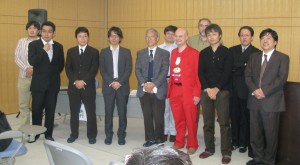How do Japanese researchers see the globalization of games? As I mentioned in my last post, games researchers in Japan are negotiating their field and how it will intersect with game studies elsewhere. While there seemed to be a consensus that they needed to be sufficiently fluent in English to both read and publish in English (the way engineering or medical researchers here do), they don’t see globalization the way we do. First of all games research here is much more interested in supporting industry than game studies in the West. What they call game studies here spans both what we call game studies and the work done in computer science, engineering, and business that work closely with industry. Game studies here is imagined to be supportive of industry in the sense that it should produce well trained students and their research should benefit industry. By contrast, game studies in the West like many humanities and social science fields, is imagined as needing a critical relation with industry. I will be looking more at the relationship with industry in other posts as it came up in many interviews, for the moment let me draw attention to the importance of Asia to Japanese game studies. Japanese youth culture exports well to Asia giving Japan “soft power” in the region, but Japan is also beginning to outsource content creation to countries like China where animators are cheaper. As one can imagine, Asia is Japan’s neighborhood historically, culturally and now economically in a way that it is not for Canada. One of the experts here in Japan on the Asian game market is Professor Nakamura.
Akinori Nakamura is a professor at Ritsumeikan who has degrees from Brigham Young University. He specializes in the Asian game market and has published a number of books about China (in Japanese).
He started his talk with the personal view that Japanese game research is behind. Games research here has been mostly technical and psychological (in the 1980s there were studies on how games might affect children.) Only now are they looking at broader organizational, international, and cultural issues. Research organizations and associations like DiGRA Japan only started after 2000. When he did his PhD he was told not to work on games and it was difficult to get funding from the government or from industry.
He then presented 3 challenges to game studies in Japan:
- They need a collaboration structure that overcomes barriers (between universities and between sectors). In Japan there are a small number of global companies and lots of small companies. Global game companies are very secretive as IP is the source of their profit. The large companies are not used to collaborating.
- They need international exchange. Games researchers can learn from what is happening elsewhere. He game the example of Singapore which has skipped Japan and is learning from Western models. Perhaps Japan needs to start learning from Asian countries that used to learn from them.
- They need standards (I’m not sure what he meant by this. He may have meant standardized conceptual vocabulary.)
Nakamura talked about the example of Taiwan which is similar to Japan. They are trying to support a content business (Japan has a tremendous content business with global potential – think about all the anime and manga that hasn’t been localized.) Taiwan has a nationwide initiative to promote industry/academia collaboration. This is missing in Japan. In Taiwan they are also thinking systematically about game design edcuation and designing courses that can move from colleges to the universities.
He closed by talking again about the issue of language, though he added that he thought they need to develop a common language of concepts and game related terms. He would like to see coordination of ideas on a global scale and for Japan to participate this means the Japanese literature needs to be surveyed.
Professor Koichi Hosoi closed the conference with some reflections:
- He mentioned how it was difficult to establish a game studies centre as the social status and research status of games is low.
- He talked about how game studies needs to also look at the gambling/gaming industry like Pachinko. (And gambling has an even lower status.)
- He commented on the gap between university research and industry.
- He commented on the issue of English.
- He talked about the need for cross-cultural studies.
- He commented on the need to look at arcades and game spaces.
- He talked about how the government is now looking at how to study and promote the manga, anime and game industry.
He finished by wishing the centre would become a hub for all interested in toys and gaming.
Reflecting back on the session and the discussions I have had since I can see that I will have to follow up on issues like:
- What is the relationship between industry and the academy? Speakers repeatedly mentioned the importance of being relevant to industry in a way that wouldn’t happen in Canada, even when there is a good relationship. Industrial relevance is clearly central to game studies here.
- Globalization and English. The games industry and game studies are struggling with the idea that English may become the language of the medium.
- Intellectual property and game creation. For all sorts of reasons the Japanese have to start paying attention to intellectual property on a global scale.
As is common in Japan, we all lined up so that pictures could be taken of all of us which each of our cameras. I’m hiding from my camera in the back. Jaakko Suiminen has the red outfit.

